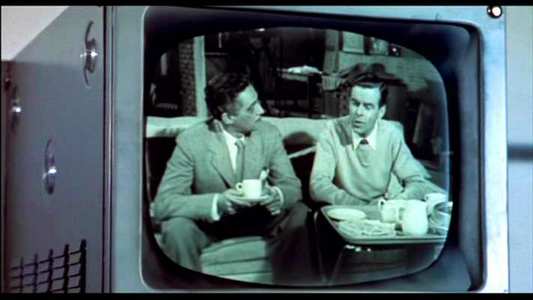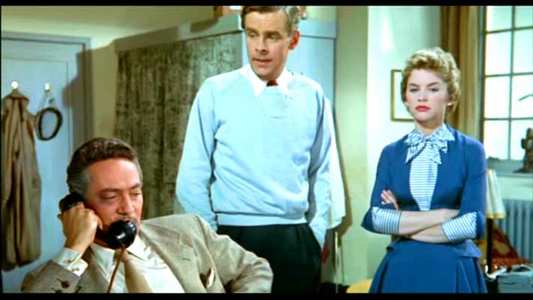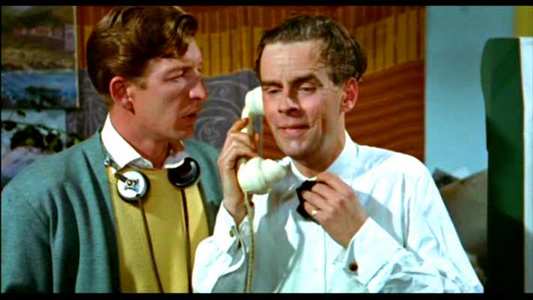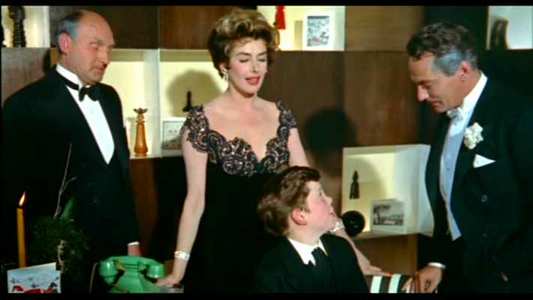Review of Simon and Laura
Introduction
This early and prophetic introduction to the concept of `reality TV` starts with senior BBC staff being called in to a meeting to hear a young and innovative new producer (Ian Carmichael) put forward his ideas for a new TV show; a daily peek into the lives of a show business couple (50 years ahead of `The Osbournes`). We hear that the Oliviers (Larry and Vivien Leigh) are unavailable, as are the Attenboroughs, which means that the only remaining contenders are the Fosters (Peter Finch and Kay Kendall).
Though their agent (Hubert Gregg) is enthusiastic about the idea, he alone knows that life in the Fosters home is like a war zone. He catches up with Simon Foster, a serial gambler, at St. Pancras station where he is about to return to his mother in Leicester. A couple of whiskies, and talk of substantial fees changes Simon`s mind and he agrees to `act` like a happy couple for the gig, as does his wife Laura. After all. "I have acted with octogenarians, dipsomaniacs, dope-fiends, amnesiacs, and veteran cars". How difficult can acting like you`re happily married actually be?
It`s only when Simon meets up with an old colleague in a gentleman`s club that he considers the potential perils of being in a reality-show. Such cynicism for a medium still in its infancy in the UK!
"My poor friend, my poor Simon, you know what happens when you allow yourself to be exhibited in that glass rectangle? I`ll tell you. You become public property. Your face, electronically distorted, is huddled round and gawped at by three-quarters of the population of the United Kingdom, and within a month every wrinkle, every wart and pustule has become part of our British way of life. Start speaking your mind and they say you`re rude and offensive. Stop speaking your mind and you`re a namby-pamby and you`re slippy…"
If only Jade Goody had heeded this warning before her second outing in the Big Brother house!
Their real life butler and maid (Maurice Denham and Thora Hird) are cast as their TV series butler and maid, and it`s not long till they become demanding ego-centric thespians, along with the rest of the cast, including an obnoxious child who the couple `adopt` to add a new dimension to their home life.
Naturally romance is soon afoot with the show`s writer ((Muriel Pavlow) revealing that she has a crush on the naïve young producer of the show, leading to some comedic opportunities based around overheard misunderstandings.
The show is a smash success, though when its popularity starts to wane, there is a suggestion that it might be time to shake things up by relegating Simon to second-fiddle. Laura will have none of it and in an overheard conversation between the young producer and Simon, all misunderstandings are washed away and Laura and Simon realise that they are still in love, as are the producer and writer. So all`s well.

Video
This is a very reasonable print transferred in 1.85:1 aspect ratio. There are slight signs of wear, but nothing to spoil your enjoyment particularly. The colours are fairly vividly painted throughout, in common with much colour work of the day.

Audio
An unremarkable mono soundtrack, though nothing particular to complain about.

Features
An image gallery.

Conclusion
This is, on the surface. a typically charming British comedy from the halcyon era that spawned so many classics. It features Ian Carmichael in classic `nice but dim` mode (played to perfection in `School for Scoundrels` and `I`m Alright Jack`) and was intended as a wry attack on the evils of television, fast emerging in 1955 as a genuine competitor to Cinema.
It`s also a remarkably prophetic piece, predicting as it does the descent of popular TV into the dull and inane world of reality television, not yet even a sparkle in the eye of young TV producers, mocked mercilessly in this cynical piece.
It`s disappointing to report, however, that despite appearing to have all the right ingredients, it`s a rather lacklustre movie with none of the sparkle of the previously mentioned Boulting brothers comedies that came a couple of years later or the wonderful Ealing comedies that slightly preceded it.
It`s an acceptably diverting piece, with some amusing scenes of early television production, and would probably be acceptable enough if you happened upon it one rainy Sunday afternoon. But there are so many better British comedies out there that this one just doesn`t seem worth the purchase price, though maybe worth a rental if all other options have been exhausted.
Your Opinions and Comments
Be the first to post a comment!